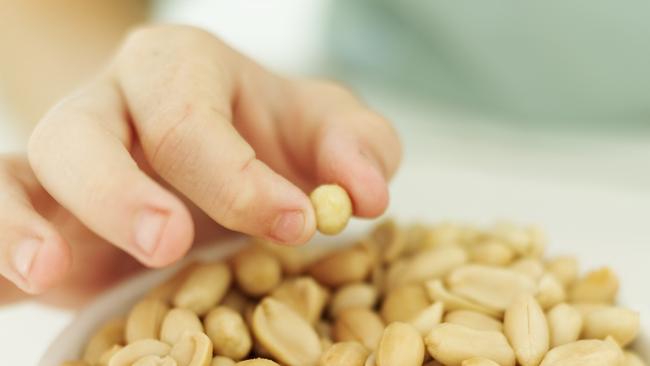Parents exposing babies to first allergenic foods in GP carparks
New guidelines mean petrified parents are increasingly exposing their infants to allergenic foods in the carparks of GP surgeries and hospitals for fear they will have a life-threatening reaction.
QLD News
Don't miss out on the headlines from QLD News. Followed categories will be added to My News.
PETRIFIED parents are increasingly exposing their infants to allergenic foods in the carparks of GP surgeries and hospitals for fear they will have a life-threatening reaction.
New guidelines, developed by the Australasian Society of Clinical Immunology and Allergy released just over a week ago, recommend nuts and eggs be introduced to babies before they turn one.
Millennials turn to Afterpay to cover dental costs
NSW inquest may look at more festival drug deaths
Queensland doctors say wary parents are in an unnecessary panic and are increasingly resorting to testing their children’s responses to potentially deadly foods in medical centre carparks so that help will be on hand.
“In my practice I have had feedback that parents are sitting in cars near medical facilities as they test the foods on their babies,” Brisbane’s Dr Wendy Burton, chair of the Royal Australian College of General Practitioner’s antenatal and post-natal care network, told The Courier-Mail.
The doctor says that myths around anaphylactic attacks online have scared parents .
“It’s awful to think they are sitting there in terror thinking that their child could die. I put this out on a GP Facebook page and honestly wasn’t surprised to find that dozens of other doctors confirm this practice.”
“This escalating fear is unfounded. Research from ASCIA shows that no child under 12 months has died from the introduction of peanuts. Misconceptions about anaphylaxis are growing.”
The “early exposure” guidelines have been introduced in a bid to reduce the country’s high allergy rate in children.

Up to eight per cent of children under five have food allergies, and 10 per cent of kids under one, with peanuts, egg, cow’s milk, wheat, soy, fish and shellfish allergies the most common.
ASCIA has called for eggs and peanuts to be introduced by 12 months, but no earlier than four months.
Previous infant feeding guidelines recommended that certain allergenic foods be avoided in early childhood.
Dr Burton believes that shift has likely added to parents’ uncertainty and said GPs should talk to parents on the issue of allergies as early as the four-month immunisation appointment.
“We have to do something about the level of fear that has crept in and education is the key. Parents need to know it is highly unlikely that their baby will have a reaction. We need to teach them that it is okay to introduce these foods at home, in a slow and steady way,” she said.
“The foods should be given to the child weekly. Of course, if there is an anaphylactic reaction call emergency.
Dr Burton said babies can become pale and floppy if they have an allergy and the tongue can become swollen.
Allergy & Anaphylaxis Australia chief executive Maria Said told The Courier-Mail concern had risen among parents.
“While the majority of babies that have peanut and egg before the age of 12 months will not develop allergies, parents are highly fearful,” she said.
“Through The Nip Allergies in the Bub campaign we have created an informative website and launched a phone line with trained health professionals to answer parent and health professional queries about introducing solids to babies.”


